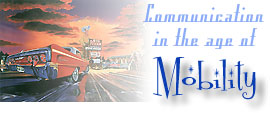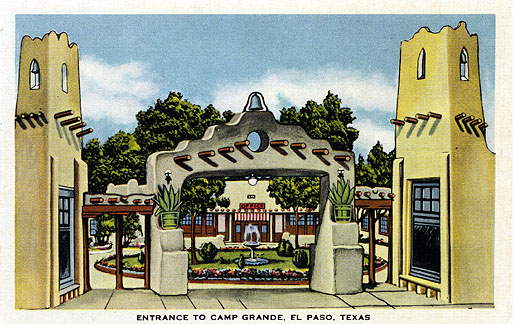
Office: HGH 210; phone: (408) 924-5378
Email: wooda@email.sjsu.edu
Web: http://www.sjsu.edu/faculty/wooda
 |
Dr. Andrew Wood Office: HGH 210; phone: (408) 924-5378 Email: wooda@email.sjsu.edu Web: http://www.sjsu.edu/faculty/wooda |
Introduction
: Course Calendar : Policies
: Readings
Assignments : Check Your Grades : Return
to Frontpage
Reading: Belasco, W.J. (1997). Americans on the road: From autocamp to motel, 1910-1945. Baltimore: The Johns Hopkins University Press.
In his chapter, "Limiting access" (pp. 105-127), Belasco notes that the "melting pot" myth - the notion that free autocamps allowed various sorts of people to mingle in shared affirmation of middle-class values - confronted the reality of more and more transients who set upon the road in cheap Model Ts.
Some of these "undesirables" were permanent auto-gypsies, folks who took glowing press accounts of year-round travel to heart. Finding the home to be "merely a service station where we stop only long enough to get supplies for a trip," many of these motorists represented a fundamental challenge to the American Dream (p. 109). However, many of these year-round travelers sought escape from an economic system that left them destitute at home. Ironically, some unions were troubled by the notion of "atomized" workers who felt a false sense of social mobility with their auto-mobility; unions feared that these workers might forget the perceived virtues of union membership if they were not connected to a particular community.

By the mid-1920s, the auto-gypsy had gone out of fashion. A traditionalist backlash responded to the growth of car ownership, fearing that poor folks were not demonstrating thrift by auto-camping; they were being irresponsible. Perhaps the car, fast and powerful, represented excess individualism - a threat neatly counter-balanced by the socialist undertones of the free autocamp. At once, it seemed like an obvious solution: make people pay to stay. Quickly, camps that had previously offered free accommodations (like El Paso's Camp Grande (above), charged a small fee. To health officials, it seemed an rational choice. This heretofore-celebrated heterogeneity of social classes was said to create breading grounds for disease - rhetorical and otherwise. To town boosters, the promised riches offered by town autocamps never materialized. Apparently, the civic duty inspired within camp-grounds failed to stretch to the storefronts awaiting tourist dollars.
Eventually, autocamps began to follow the way of hotels they'd previously challenged, particularly with the introduction of guest registration:
Like the camp, the hotel traced its roots to the legendary medieval inn or caravansary along the open road. Lively and egalitarian, these inns had hosted a diverse clientele of radical thinkers, heretics, and highwaymen. Such gatherings of anonymous strangers had threatened order, however, [because] local citizens were exposed to foreign, potentially subversive ideas. Town sheriffs introduced the inn register as a way for sedentary society to put a brake on road freedom. The autocamp followed in the same direction. Like the license plate and driver's license, the camp register was a move to control excessive automotive independence. (p. 123)
Naturally, it was inevitable that hotel-owners would argue that city-sponsored camps represented unfair competition with private enterprise. However, as city-center camps lost popularity, farmers got an idea: now that tourists have grown used to the notion of paying a small fee for accommodations along the road, perhaps they might wish to skip the city altogether and stay further out of town, along the highway. From this inspiration, the tourist cottage - precursor to the motel - would be born.